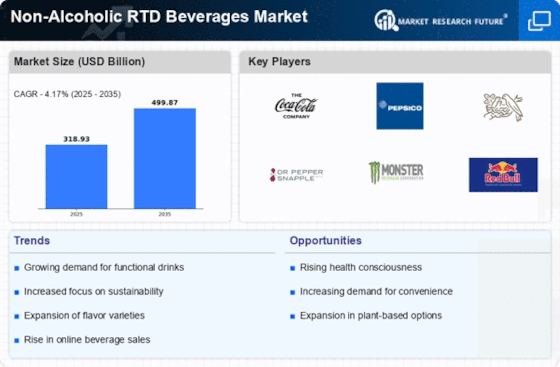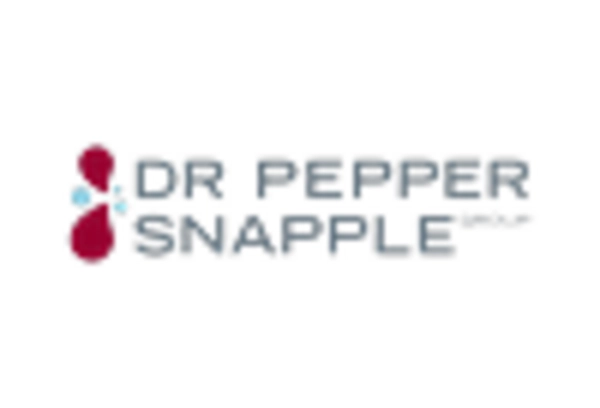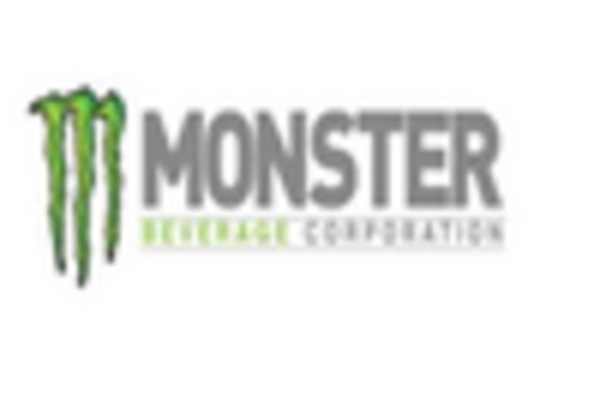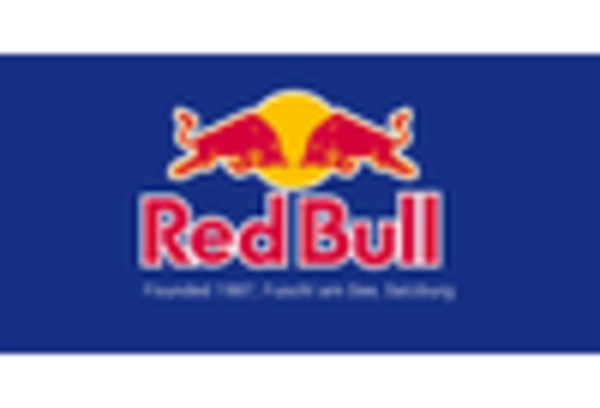Soft Drinks
Juices
Tea
Coffee
Energy Drinks
Bottles
Cans
Pouches
Cartons
Dispenser
Supermarkets
Convenience Stores
Online Retail
Health Food Stores
Vending Machines
Citrus
Berry
Herbal
Spicy
Vanilla
North America
Europe
South America
Asia Pacific
Middle East and Africa
North America Outlook (USD Billion, 2019-2035)
North America Non-Alcoholic RTD Beverages Market by Product Type
Soft Drinks
Juices
Tea
Coffee
Energy Drinks
North America Non-Alcoholic RTD Beverages Market by Packaging Type
Bottles
Cans
Pouches
Cartons
Dispenser
North America Non-Alcoholic RTD Beverages Market by Distribution Channel Type
Supermarkets
Convenience Stores
Online Retail
Health Food Stores
Vending Machines
North America Non-Alcoholic RTD Beverages Market by Flavor Type
Citrus
Berry
Herbal
Spicy
Vanilla
North America Non-Alcoholic RTD Beverages Market by Regional Type
US
Canada
US Outlook (USD Billion, 2019-2035)
US Non-Alcoholic RTD Beverages Market by Product Type
Soft Drinks
Juices
Tea
Coffee
Energy Drinks
US Non-Alcoholic RTD Beverages Market by Packaging Type
Bottles
Cans
Pouches
Cartons
Dispenser
US Non-Alcoholic RTD Beverages Market by Distribution Channel Type
Supermarkets
Convenience Stores
Online Retail
Health Food Stores
Vending Machines
US Non-Alcoholic RTD Beverages Market by Flavor Type
Citrus
Berry
Herbal
Spicy
Vanilla
CANADA Outlook (USD Billion, 2019-2035)
CANADA Non-Alcoholic RTD Beverages Market by Product Type
Soft Drinks
Juices
Tea
Coffee
Energy Drinks
CANADA Non-Alcoholic RTD Beverages Market by Packaging Type
Bottles
Cans
Pouches
Cartons
Dispenser
CANADA Non-Alcoholic RTD Beverages Market by Distribution Channel Type
Supermarkets
Convenience Stores
Online Retail
Health Food Stores
Vending Machines
CANADA Non-Alcoholic RTD Beverages Market by Flavor Type
Citrus
Berry
Herbal
Spicy
Vanilla
Europe Outlook (USD Billion, 2019-2035)
Europe Non-Alcoholic RTD Beverages Market by Product Type
Soft Drinks
Juices
Tea
Coffee
Energy Drinks
Europe Non-Alcoholic RTD Beverages Market by Packaging Type
Bottles
Cans
Pouches
Cartons
Dispenser
Europe Non-Alcoholic RTD Beverages Market by Distribution Channel Type
Supermarkets
Convenience Stores
Online Retail
Health Food Stores
Vending Machines
Europe Non-Alcoholic RTD Beverages Market by Flavor Type
Citrus
Berry
Herbal
Spicy
Vanilla
Europe Non-Alcoholic RTD Beverages Market by Regional Type
Germany
UK
France
Russia
Italy
Spain
Rest of Europe
GERMANY Outlook (USD Billion, 2019-2035)
GERMANY Non-Alcoholic RTD Beverages Market by Product Type
Soft Drinks
Juices
Tea
Coffee
Energy Drinks
GERMANY Non-Alcoholic RTD Beverages Market by Packaging Type
Bottles
Cans
Pouches
Cartons
Dispenser
GERMANY Non-Alcoholic RTD Beverages Market by Distribution Channel Type
Supermarkets
Convenience Stores
Online Retail
Health Food Stores
Vending Machines
GERMANY Non-Alcoholic RTD Beverages Market by Flavor Type
Citrus
Berry
Herbal
Spicy
Vanilla
UK Outlook (USD Billion, 2019-2035)
UK Non-Alcoholic RTD Beverages Market by Product Type
Soft Drinks
Juices
Tea
Coffee
Energy Drinks
UK Non-Alcoholic RTD Beverages Market by Packaging Type
Bottles
Cans
Pouches
Cartons
Dispenser
UK Non-Alcoholic RTD Beverages Market by Distribution Channel Type
Supermarkets
Convenience Stores
Online Retail
Health Food Stores
Vending Machines
UK Non-Alcoholic RTD Beverages Market by Flavor Type
Citrus
Berry
Herbal
Spicy
Vanilla
FRANCE Outlook (USD Billion, 2019-2035)
FRANCE Non-Alcoholic RTD Beverages Market by Product Type
Soft Drinks
Juices
Tea
Coffee
Energy Drinks
FRANCE Non-Alcoholic RTD Beverages Market by Packaging Type
Bottles
Cans
Pouches
Cartons
Dispenser
FRANCE Non-Alcoholic RTD Beverages Market by Distribution Channel Type
Supermarkets
Convenience Stores
Online Retail
Health Food Stores
Vending Machines
FRANCE Non-Alcoholic RTD Beverages Market by Flavor Type
Citrus
Berry
Herbal
Spicy
Vanilla
RUSSIA Outlook (USD Billion, 2019-2035)
RUSSIA Non-Alcoholic RTD Beverages Market by Product Type
Soft Drinks
Juices
Tea
Coffee
Energy Drinks
RUSSIA Non-Alcoholic RTD Beverages Market by Packaging Type
Bottles
Cans
Pouches
Cartons
Dispenser
RUSSIA Non-Alcoholic RTD Beverages Market by Distribution Channel Type
Supermarkets
Convenience Stores
Online Retail
Health Food Stores
Vending Machines
RUSSIA Non-Alcoholic RTD Beverages Market by Flavor Type
Citrus
Berry
Herbal
Spicy
Vanilla
ITALY Outlook (USD Billion, 2019-2035)
ITALY Non-Alcoholic RTD Beverages Market by Product Type
Soft Drinks
Juices
Tea
Coffee
Energy Drinks
ITALY Non-Alcoholic RTD Beverages Market by Packaging Type
Bottles
Cans
Pouches
Cartons
Dispenser
ITALY Non-Alcoholic RTD Beverages Market by Distribution Channel Type
Supermarkets
Convenience Stores
Online Retail
Health Food Stores
Vending Machines
ITALY Non-Alcoholic RTD Beverages Market by Flavor Type
Citrus
Berry
Herbal
Spicy
Vanilla
SPAIN Outlook (USD Billion, 2019-2035)
SPAIN Non-Alcoholic RTD Beverages Market by Product Type
Soft Drinks
Juices
Tea
Coffee
Energy Drinks
SPAIN Non-Alcoholic RTD Beverages Market by Packaging Type
Bottles
Cans
Pouches
Cartons
Dispenser
SPAIN Non-Alcoholic RTD Beverages Market by Distribution Channel Type
Supermarkets
Convenience Stores
Online Retail
Health Food Stores
Vending Machines
SPAIN Non-Alcoholic RTD Beverages Market by Flavor Type
Citrus
Berry
Herbal
Spicy
Vanilla
REST OF EUROPE Outlook (USD Billion, 2019-2035)
REST OF EUROPE Non-Alcoholic RTD Beverages Market by Product Type
Soft Drinks
Juices
Tea
Coffee
Energy Drinks
REST OF EUROPE Non-Alcoholic RTD Beverages Market by Packaging Type
Bottles
Cans
Pouches
Cartons
Dispenser
REST OF EUROPE Non-Alcoholic RTD Beverages Market by Distribution Channel Type
Supermarkets
Convenience Stores
Online Retail
Health Food Stores
Vending Machines
REST OF EUROPE Non-Alcoholic RTD Beverages Market by Flavor Type
Citrus
Berry
Herbal
Spicy
Vanilla
APAC Outlook (USD Billion, 2019-2035)
APAC Non-Alcoholic RTD Beverages Market by Product Type
Soft Drinks
Juices
Tea
Coffee
Energy Drinks
APAC Non-Alcoholic RTD Beverages Market by Packaging Type
Bottles
Cans
Pouches
Cartons
Dispenser
APAC Non-Alcoholic RTD Beverages Market by Distribution Channel Type
Supermarkets
Convenience Stores
Online Retail
Health Food Stores
Vending Machines
APAC Non-Alcoholic RTD Beverages Market by Flavor Type
Citrus
Berry
Herbal
Spicy
Vanilla
APAC Non-Alcoholic RTD Beverages Market by Regional Type
China
India
Japan
South Korea
Malaysia
Thailand
Indonesia
Rest of APAC
CHINA Outlook (USD Billion, 2019-2035)
CHINA Non-Alcoholic RTD Beverages Market by Product Type
Soft Drinks
Juices
Tea
Coffee
Energy Drinks
CHINA Non-Alcoholic RTD Beverages Market by Packaging Type
Bottles
Cans
Pouches
Cartons
Dispenser
CHINA Non-Alcoholic RTD Beverages Market by Distribution Channel Type
Supermarkets
Convenience Stores
Online Retail
Health Food Stores
Vending Machines
CHINA Non-Alcoholic RTD Beverages Market by Flavor Type
Citrus
Berry
Herbal
Spicy
Vanilla
INDIA Outlook (USD Billion, 2019-2035)
INDIA Non-Alcoholic RTD Beverages Market by Product Type
Soft Drinks
Juices
Tea
Coffee
Energy Drinks
INDIA Non-Alcoholic RTD Beverages Market by Packaging Type
Bottles
Cans
Pouches
Cartons
Dispenser
INDIA Non-Alcoholic RTD Beverages Market by Distribution Channel Type
Supermarkets
Convenience Stores
Online Retail
Health Food Stores
Vending Machines
INDIA Non-Alcoholic RTD Beverages Market by Flavor Type
Citrus
Berry
Herbal
Spicy
Vanilla
JAPAN Outlook (USD Billion, 2019-2035)
JAPAN Non-Alcoholic RTD Beverages Market by Product Type
Soft Drinks
Juices
Tea
Coffee
Energy Drinks
JAPAN Non-Alcoholic RTD Beverages Market by Packaging Type
Bottles
Cans
Pouches
Cartons
Dispenser
JAPAN Non-Alcoholic RTD Beverages Market by Distribution Channel Type
Supermarkets
Convenience Stores
Online Retail
Health Food Stores
Vending Machines
JAPAN Non-Alcoholic RTD Beverages Market by Flavor Type
Citrus
Berry
Herbal
Spicy
Vanilla
SOUTH KOREA Outlook (USD Billion, 2019-2035)
SOUTH KOREA Non-Alcoholic RTD Beverages Market by Product Type
Soft Drinks
Juices
Tea
Coffee
Energy Drinks
SOUTH KOREA Non-Alcoholic RTD Beverages Market by Packaging Type
Bottles
Cans
Pouches
Cartons
Dispenser
SOUTH KOREA Non-Alcoholic RTD Beverages Market by Distribution Channel Type
Supermarkets
Convenience Stores
Online Retail
Health Food Stores
Vending Machines
SOUTH KOREA Non-Alcoholic RTD Beverages Market by Flavor Type
Citrus
Berry
Herbal
Spicy
Vanilla
MALAYSIA Outlook (USD Billion, 2019-2035)
MALAYSIA Non-Alcoholic RTD Beverages Market by Product Type
Soft Drinks
Juices
Tea
Coffee
Energy Drinks
MALAYSIA Non-Alcoholic RTD Beverages Market by Packaging Type
Bottles
Cans
Pouches
Cartons
Dispenser
MALAYSIA Non-Alcoholic RTD Beverages Market by Distribution Channel Type
Supermarkets
Convenience Stores
Online Retail
Health Food Stores
Vending Machines
MALAYSIA Non-Alcoholic RTD Beverages Market by Flavor Type
Citrus
Berry
Herbal
Spicy
Vanilla
THAILAND Outlook (USD Billion, 2019-2035)
THAILAND Non-Alcoholic RTD Beverages Market by Product Type
Soft Drinks
Juices
Tea
Coffee
Energy Drinks
THAILAND Non-Alcoholic RTD Beverages Market by Packaging Type
Bottles
Cans
Pouches
Cartons
Dispenser
THAILAND Non-Alcoholic RTD Beverages Market by Distribution Channel Type
Supermarkets
Convenience Stores
Online Retail
Health Food Stores
Vending Machines
THAILAND Non-Alcoholic RTD Beverages Market by Flavor Type
Citrus
Berry
Herbal
Spicy
Vanilla
INDONESIA Outlook (USD Billion, 2019-2035)
INDONESIA Non-Alcoholic RTD Beverages Market by Product Type
Soft Drinks
Juices
Tea
Coffee
Energy Drinks
INDONESIA Non-Alcoholic RTD Beverages Market by Packaging Type
Bottles
Cans
Pouches
Cartons
Dispenser
INDONESIA Non-Alcoholic RTD Beverages Market by Distribution Channel Type
Supermarkets
Convenience Stores
Online Retail
Health Food Stores
Vending Machines
INDONESIA Non-Alcoholic RTD Beverages Market by Flavor Type
Citrus
Berry
Herbal
Spicy
Vanilla
REST OF APAC Outlook (USD Billion, 2019-2035)
REST OF APAC Non-Alcoholic RTD Beverages Market by Product Type
Soft Drinks
Juices
Tea
Coffee
Energy Drinks
REST OF APAC Non-Alcoholic RTD Beverages Market by Packaging Type
Bottles
Cans
Pouches
Cartons
Dispenser
REST OF APAC Non-Alcoholic RTD Beverages Market by Distribution Channel Type
Supermarkets
Convenience Stores
Online Retail
Health Food Stores
Vending Machines
REST OF APAC Non-Alcoholic RTD Beverages Market by Flavor Type
Citrus
Berry
Herbal
Spicy
Vanilla
South America Outlook (USD Billion, 2019-2035)
South America Non-Alcoholic RTD Beverages Market by Product Type
Soft Drinks
Juices
Tea
Coffee
Energy Drinks
South America Non-Alcoholic RTD Beverages Market by Packaging Type
Bottles
Cans
Pouches
Cartons
Dispenser
South America Non-Alcoholic RTD Beverages Market by Distribution Channel Type
Supermarkets
Convenience Stores
Online Retail
Health Food Stores
Vending Machines
South America Non-Alcoholic RTD Beverages Market by Flavor Type
Citrus
Berry
Herbal
Spicy
Vanilla
South America Non-Alcoholic RTD Beverages Market by Regional Type
Brazil
Mexico
Argentina
Rest of South America
BRAZIL Outlook (USD Billion, 2019-2035)
BRAZIL Non-Alcoholic RTD Beverages Market by Product Type
Soft Drinks
Juices
Tea
Coffee
Energy Drinks
BRAZIL Non-Alcoholic RTD Beverages Market by Packaging Type
Bottles
Cans
Pouches
Cartons
Dispenser
BRAZIL Non-Alcoholic RTD Beverages Market by Distribution Channel Type
Supermarkets
Convenience Stores
Online Retail
Health Food Stores
Vending Machines
BRAZIL Non-Alcoholic RTD Beverages Market by Flavor Type
Citrus
Berry
Herbal
Spicy
Vanilla
MEXICO Outlook (USD Billion, 2019-2035)
MEXICO Non-Alcoholic RTD Beverages Market by Product Type
Soft Drinks
Juices
Tea
Coffee
Energy Drinks
MEXICO Non-Alcoholic RTD Beverages Market by Packaging Type
Bottles
Cans
Pouches
Cartons
Dispenser
MEXICO Non-Alcoholic RTD Beverages Market by Distribution Channel Type
Supermarkets
Convenience Stores
Online Retail
Health Food Stores
Vending Machines
MEXICO Non-Alcoholic RTD Beverages Market by Flavor Type
Citrus
Berry
Herbal
Spicy
Vanilla
ARGENTINA Outlook (USD Billion, 2019-2035)
ARGENTINA Non-Alcoholic RTD Beverages Market by Product Type
Soft Drinks
Juices
Tea
Coffee
Energy Drinks
ARGENTINA Non-Alcoholic RTD Beverages Market by Packaging Type
Bottles
Cans
Pouches
Cartons
Dispenser
ARGENTINA Non-Alcoholic RTD Beverages Market by Distribution Channel Type
Supermarkets
Convenience Stores
Online Retail
Health Food Stores
Vending Machines
ARGENTINA Non-Alcoholic RTD Beverages Market by Flavor Type
Citrus
Berry
Herbal
Spicy
Vanilla
REST OF SOUTH AMERICA Outlook (USD Billion, 2019-2035)
REST OF SOUTH AMERICA Non-Alcoholic RTD Beverages Market by Product Type
Soft Drinks
Juices
Tea
Coffee
Energy Drinks
REST OF SOUTH AMERICA Non-Alcoholic RTD Beverages Market by Packaging Type
Bottles
Cans
Pouches
Cartons
Dispenser
REST OF SOUTH AMERICA Non-Alcoholic RTD Beverages Market by Distribution Channel Type
Supermarkets
Convenience Stores
Online Retail
Health Food Stores
Vending Machines
REST OF SOUTH AMERICA Non-Alcoholic RTD Beverages Market by Flavor Type
Citrus
Berry
Herbal
Spicy
Vanilla
MEA Outlook (USD Billion, 2019-2035)
MEA Non-Alcoholic RTD Beverages Market by Product Type
Soft Drinks
Juices
Tea
Coffee
Energy Drinks
MEA Non-Alcoholic RTD Beverages Market by Packaging Type
Bottles
Cans
Pouches
Cartons
Dispenser
MEA Non-Alcoholic RTD Beverages Market by Distribution Channel Type
Supermarkets
Convenience Stores
Online Retail
Health Food Stores
Vending Machines
MEA Non-Alcoholic RTD Beverages Market by Flavor Type
Citrus
Berry
Herbal
Spicy
Vanilla
MEA Non-Alcoholic RTD Beverages Market by Regional Type
GCC Countries
South Africa
Rest of MEA
GCC COUNTRIES Outlook (USD Billion, 2019-2035)
GCC COUNTRIES Non-Alcoholic RTD Beverages Market by Product Type
Soft Drinks
Juices
Tea
Coffee
Energy Drinks
GCC COUNTRIES Non-Alcoholic RTD Beverages Market by Packaging Type
Bottles
Cans
Pouches
Cartons
Dispenser
GCC COUNTRIES Non-Alcoholic RTD Beverages Market by Distribution Channel Type
Supermarkets
Convenience Stores
Online Retail
Health Food Stores
Vending Machines
GCC COUNTRIES Non-Alcoholic RTD Beverages Market by Flavor Type
Citrus
Berry
Herbal
Spicy
Vanilla
SOUTH AFRICA Outlook (USD Billion, 2019-2035)
SOUTH AFRICA Non-Alcoholic RTD Beverages Market by Product Type
Soft Drinks
Juices
Tea
Coffee
Energy Drinks
SOUTH AFRICA Non-Alcoholic RTD Beverages Market by Packaging Type
Bottles
Cans
Pouches
Cartons
Dispenser
SOUTH AFRICA Non-Alcoholic RTD Beverages Market by Distribution Channel Type
Supermarkets
Convenience Stores
Online Retail
Health Food Stores
Vending Machines
SOUTH AFRICA Non-Alcoholic RTD Beverages Market by Flavor Type
Citrus
Berry
Herbal
Spicy
Vanilla
REST OF MEA Outlook (USD Billion, 2019-2035)
REST OF MEA Non-Alcoholic RTD Beverages Market by Product Type
Soft Drinks
Juices
Tea
Coffee
Energy Drinks
REST OF MEA Non-Alcoholic RTD Beverages Market by Packaging Type
Bottles
Cans
Pouches
Cartons
Dispenser
REST OF MEA Non-Alcoholic RTD Beverages Market by Distribution Channel Type
Supermarkets
Convenience Stores
Online Retail
Health Food Stores
Vending Machines
REST OF MEA Non-Alcoholic RTD Beverages Market by Flavor Type
Citrus
Berry
Herbal
Spicy
Vanilla


















Leave a Comment